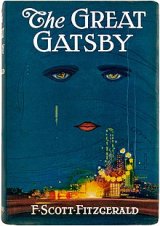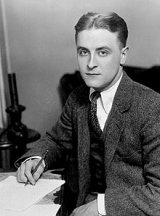The Great Gatsby Page #36
The Great Gatsby is a 1925 novel by American writer F. Scott Fitzgerald. Set in the Jazz Age on Long Island, near New York City, the novel depicts first-person narrator Nick Carraway's interactions with mysterious millionaire Jay Gatsby and Gatsby's obsession to reunite with his former lover, Daisy Buchanan. The novel was inspired by a youthful romance Fitzgerald had with socialite Ginevra King, and the riotous parties he attended on Long Island's North Shore in 1922
never told me definitely that his parents were dead. But there was nothing—only the picture of Dan Cody, a token of forgotten violence, staring down from the wall. Next morning I sent the butler to New York with a letter to Wolfshiem, which asked for information and urged him to come out on the next train. That request seemed superfluous when I wrote it. I was sure he’d start when he saw the newspapers, just as I was sure there’d be a wire from Daisy before noon—but neither a wire nor Mr. Wolfshiem arrived; no one arrived except more police and photographers and newspaper men. When the butler brought back Wolfshiem’s answer I began to have a feeling of defiance, of scornful solidarity between Gatsby and me against them all. Dear Mr. Carraway. This has been one of the most terrible shocks of my life to me I hardly can believe it that it is true at all. Such a mad act as that man did should make us all think. I cannot come down now as I am tied up in some very important business and cannot get mixed up in this thing now. If there is anything I can do a little later let me know in a letter by Edgar. I hardly know where I am when I hear about a thing like this and am completely knocked down and out. Yours truly Meyer Wolfshiem and then hasty addenda beneath: Let me know about the funeral etc do not know his family at all. When the phone rang that afternoon and Long Distance said Chicago was calling I thought this would be Daisy at last. But the connection came through as a man’s voice, very thin and far away. “This is Slagle speaking …” “Yes?” The name was unfamiliar. “Hell of a note, isn’t it? Get my wire?” “There haven’t been any wires.” “Young Parke’s in trouble,” he said rapidly. “They picked him up when he handed the bonds over the counter. They got a circular from New York giving ’em the numbers just five minutes before. What d’you know about that, hey? You never can tell in these hick towns—” “Hello!” I interrupted breathlessly. “Look here—this isn’t Mr. Gatsby. Mr. Gatsby’s dead.” There was a long silence on the other end of the wire, followed by an exclamation … then a quick squawk as the connection was broken. ------------------------------------------------------------------------ I think it was on the third day that a telegram signed Henry C. Gatz arrived from a town in Minnesota. It said only that the sender was leaving immediately and to postpone the funeral until he came. It was Gatsby’s father, a solemn old man, very helpless and dismayed, bundled up in a long cheap ulster against the warm September day. His eyes leaked continuously with excitement, and when I took the bag and umbrella from his hands he began to pull so incessantly at his sparse grey beard that I had difficulty in getting off his coat. He was on the point of collapse, so I took him into the music-room and made him sit down while I sent for something to eat. But he wouldn’t eat, and the glass of milk spilled from his trembling hand. “I saw it in the Chicago newspaper,” he said. “It was all in the Chicago newspaper. I started right away.” “I didn’t know how to reach you.” His eyes, seeing nothing, moved ceaselessly about the room. “It was a madman,” he said. “He must have been mad.” “Wouldn’t you like some coffee?” I urged him. “I don’t want anything. I’m all right now, Mr.—” “Carraway.” “Well, I’m all right now. Where have they got Jimmy?” I took him into the drawing-room, where his son lay, and left him there. Some little boys had come up on the steps and were looking into the hall; when I told them who had arrived, they went reluctantly away. After a little while Mr. Gatz opened the door and came out, his mouth ajar, his face flushed slightly, his eyes leaking isolated and unpunctual tears. He had reached an age where death no longer has the quality of ghastly surprise, and when he looked around him now for the first time and saw the height and splendour of the hall and the great rooms opening out from it into other rooms, his grief began to be mixed with an awed pride. I helped him to a bedroom upstairs; while he took off his coat and vest I told him that all arrangements had been deferred until he came. “I didn’t know what you’d want, Mr. Gatsby—” “Gatz is my name.” “—Mr. Gatz. I thought you might want to take the body West.” He shook his head. “Jimmy always liked it better down East. He rose up to his position in the East. Were you a friend of my boy’s, Mr.—?” “We were close friends.” “He had a big future before him, you know. He was only a young man, but he had a lot of brain power here.” He touched his head impressively, and I nodded. “If he’d of lived, he’d of been a great man. A man like James J. Hill. He’d of helped build up the country.” “That’s true,” I said, uncomfortably. He fumbled at the embroidered coverlet, trying to take it from the bed, and lay down stiffly—was instantly asleep. That night an obviously frightened person called up, and demanded to know who I was before he would give his name. “This is Mr. Carraway,” I said. “Oh!” He sounded relieved. “This is Klipspringer.” I was relieved too, for that seemed to promise another friend at Gatsby’s grave. I didn’t want it to be in the papers and draw a sightseeing crowd, so I’d been calling up a few people myself. They were hard to find. “The funeral’s tomorrow,” I said. “Three o’clock, here at the house. I wish you’d tell anybody who’d be interested.” “Oh, I will,” he broke out hastily. “Of course I’m not likely to see anybody, but if I do.” His tone made me suspicious. “Of course you’ll be there yourself.” “Well, I’ll certainly try. What I called up about is—” “Wait a minute,” I interrupted. “How about saying you’ll come?” “Well, the fact is—the truth of the matter is that I’m staying with some people up here in Greenwich, and they rather expect me to be with them tomorrow. In fact, there’s a sort of picnic or something. Of course I’ll do my best to get away.” I ejaculated an unrestrained “Huh!” and he must have heard me, for he went on nervously: “What I called up about was a pair of shoes I left there. I wonder if it’d be too much trouble to have the butler send them on. You see, they’re tennis shoes, and I’m sort of helpless without them. My address is care of B. F.—” I didn’t hear the rest of the name, because I hung up the receiver. After that I felt a certain shame for Gatsby—one gentleman to whom I telephoned implied that he had got what he deserved. However, that was my fault, for he was one of those who used to sneer most bitterly at Gatsby on the courage of Gatsby’s liquor, and I should have known better than to call him. The morning of the funeral I went up to New York to see Meyer Wolfshiem; I couldn’t seem to reach him any other way. The door that I pushed open, on the advice of an elevator boy, was marked “The Swastika Holding Company,” and at first there didn’t seem to be anyone
Translation
Translate and read this book in other languages:
Select another language:
- - Select -
- 简体中文 (Chinese - Simplified)
- 繁體中文 (Chinese - Traditional)
- Español (Spanish)
- Esperanto (Esperanto)
- 日本語 (Japanese)
- Português (Portuguese)
- Deutsch (German)
- العربية (Arabic)
- Français (French)
- Русский (Russian)
- ಕನ್ನಡ (Kannada)
- 한국어 (Korean)
- עברית (Hebrew)
- Gaeilge (Irish)
- Українська (Ukrainian)
- اردو (Urdu)
- Magyar (Hungarian)
- मानक हिन्दी (Hindi)
- Indonesia (Indonesian)
- Italiano (Italian)
- தமிழ் (Tamil)
- Türkçe (Turkish)
- తెలుగు (Telugu)
- ภาษาไทย (Thai)
- Tiếng Việt (Vietnamese)
- Čeština (Czech)
- Polski (Polish)
- Bahasa Indonesia (Indonesian)
- Românește (Romanian)
- Nederlands (Dutch)
- Ελληνικά (Greek)
- Latinum (Latin)
- Svenska (Swedish)
- Dansk (Danish)
- Suomi (Finnish)
- فارسی (Persian)
- ייִדיש (Yiddish)
- հայերեն (Armenian)
- Norsk (Norwegian)
- English (English)
Citation
Use the citation below to add this book to your bibliography:
Style:MLAChicagoAPA
"The Great Gatsby Books." Literature.com. STANDS4 LLC, 2025. Web. 27 Feb. 2025. <https://www.literature.com/book/the_great_gatsby_1598>.








Discuss this The Great Gatsby book with the community:
Report Comment
We're doing our best to make sure our content is useful, accurate and safe.
If by any chance you spot an inappropriate comment while navigating through our website please use this form to let us know, and we'll take care of it shortly.
Attachment
You need to be logged in to favorite.
Log In